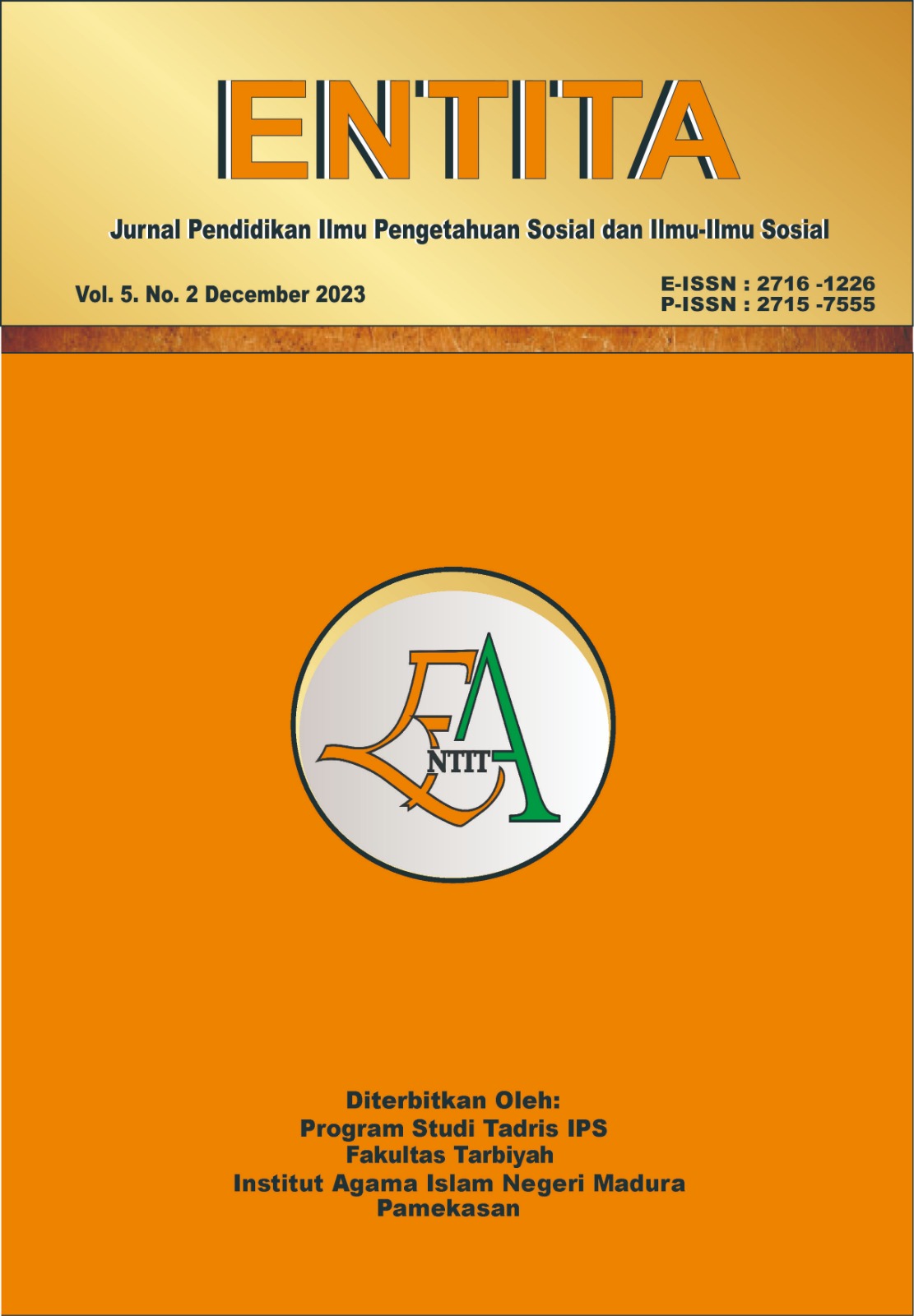Penguatan Modal Sosial Melalui Nilai Mapalus pada Pembelajaran Pendidikan IPS
 Abstract views: 334
,
Abstract views: 334
,
 PDF downloads: 591
PDF downloads: 591
Abstract
Social capital is a key aspect in nurturing inclusive and sustainable learners. Efforts to strengthen social capital in students in this era of globalization can be achieved through the integration of the "mapalus" values into Social Studies (IPS) education. This research employs a qualitative approach with data collection methods including interviews with teachers and students, observations, and document analysis. The findings of this study indicate that the integration of "mapalus" values into IPS education can be considered an effective strategy for enhancing students' social capital. Mapalus-based IPS learning encourages students to become active and responsible members of society. The local wisdom of "mapalus" values applied teaches the importance of mutual assistance and the development of social skills in students.
Downloads
References
Amalia, N., Siagian, N., Riani, L., Faradila, I., Wulandari, N., & Rambe, U. K. (2021). Keaktifan gotong royong berpengaruh meningkatkan interakasi sosial dan menumbuhkan rasa solidaritas di Desa Siamporik. Edumaspul: Jurnal Pendidikan, 5(2), 75–80.
Anwar, A. (2016). Kontribusi Keluarga terhadap Pembentukan Karakter Anak (Studi Perspektif Modal Sosial di Kota Parepare). Kuriositas: Media Komunikasi Sosial Dan Keagamaan, 9(1), 57–65.
Berdame, J., & Lombogia, C. A. R. (2020). Merajut tradisi di tengah transisi: Pendidikan lingkungan hidup berbasis kearifan lokal dalam budaya mapalus suku minahasa. Tumou Tou, 7(2), 128–142.
Creswel, John. W. (2008). Re[1] J. W. Creswel, Research Design: Qualitative, Quantitative, and Mixed Methods Approaches. SAGE Publications, 2008.search Design: Qualitative, Quantitative, and Mixed Methods Approaches. In sage publications.
Dwiningrum, S. I. A. (2014). Modal Sosial dalam Pengembangan Pendidikan. Perspektif Teori dan Praktik.
Pangalila, T., & Mantiri, J. (2020). Nilai budaya masyarakat Sulawesi Utara sebagai model pendidikan toleransi. Jurnal Ilmiah Mimbar Demokrasi, 20(1), 1–10.
Prasetyo, D., & Marzuki, M. (2016). Pembinaan karakter melalui keteladanan guru pendidikan kewarganegaraan di Sekolah Islam Al Azhar Yogyakarta. Jurnal Pendidikan Karakter, 7(2).
Puspitasari, R., & Suherman, A. (2019). Analisa Kurikulum Bermuatan Modal Sosial dalam Pembelajaran IPS di MTS/SMP Se Kota Cirebon. Edueksos Jurnal Pendidikan Sosial & Ekonomi, 8(1).
Ramdani, Z. (2014). Integrasi Pendidikan Karakter dalam Pembelajaran IPS di MTsN Model Selong Lombok Timur. SOCIA: Jurnal Ilmu-Ilmu Sosial, 11(1).
Resmalasari, S., & Pd, M. (n.d.). PENGARUH PEMBELAJARAN IPS TERHADAP MODAL SOSIAL SISWA. https://doi.org/10.24235/ath.v%vi%i.7277
Ristek, K. (2021). Profil Pelajar Pancasila. Kementerian Pendidikan Dan Kebudayaan, 1–108.
Salaki, R. J. (2014). Membangun karakter generasi muda melalui budaya mapalus suku minahasa. Jurnal Studi Sosial, 1(6), 47–52.
Sapriya. (2014). Pendidikan IPS Konsep dan Pembelajaran (Effendi Daries, Ed.; 1st ed.). PT. Remaja Rosdakarya.
Subiyakto, B., Rahman, G., & Brigjen Hasan Basry Banjarmasin, J. H. (n.d.). Nilai-Nilai Gotong Royong Pada Tradisi Bahaul Dalam Masyarakat Banjar Di Desa Andhika Sebagai Sumber Pembelajaran Ips.
Surbakti, D. A., & Supartono, S. (2016). Pengembangan Karakter Siswa Pada Pembelajaran Kimia Berbasis Teknologi Informasi Menggunakan Metode Diskusi. Jurnal Inovasi Pendidikan Kimia, 10(2).
Suttrisno, S., & Rofi’ah, F. Z. (2023). Integrasi Nilai-Nilai Kearifan Lokal Guna Mengoptimalkan Projek Penguatan Pelajar Pancasila Madrasah Ibtidaiyah Di Bojonegoro. Pionir: Jurnal Pendidikan, 12(1).
Usoh, E. J., & Lumentut, R. (2023). Pengaruh Media Sosial Terhadap Karakter Siswa di SMA Regenerasi Tateli, Kabupaten Minahasa. Wunong of Educational Research, 2(1), 14–17.
Utomo, E. P. (2018). Internalisasi nilai karakter gotong royong dalam pembelajaran IPS untuk membangun modal sosial peserta didik. Jurnal Teori Dan Praksis Pembelajaran IPS, 3(2), 95–102.
Copyright (c) 2023 ENTITA: Jurnal Pendidikan Ilmu Pengetahuan Sosial dan Ilmu-Ilmu Sosial

This work is licensed under a Creative Commons Attribution-NonCommercial 4.0 International License.
ENTITA: Jurnal Pendidikan Ilmu Pengetahuan Sosial dan Ilmu-Ilmu Sosial operates an Open Access policy under a Creative Commons Non-Commercial 4.0 International license. Authors who publish with this journal agree to the following terms:
- The copyright of the received article once accepted for publication shall be assigned to the journal as the publisher with licensed under a

- Journal is able to enter into separate, additional contractual arrangements for the non-exclusive distribution of the journal's published version of the work (e.g., post it to an institutional repository or publish it in a book), with an acknowledgement of its initial publication in this journal.
- Journal is permitted and encouraged to post their work online (e.g., in institutional repositories or on their website) prior to and during the submission process, as it can lead to productive exchanges, as well as earlier and greater citation of published work (see The Effect of Open Access).
- Here is Copyright Transfer Form that author can download and send to OJS during submission.

















